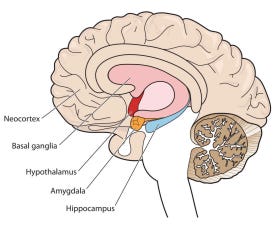PTSD Within the Brain
Written by Ivory Chen
PTSD: Post-traumatic stress disorder. This disease notoriously affects 13 million Americans each year. While trauma following any stressful incident is a normal bodily response to an extent, PTSD most commonly develops from extreme traumas involved with combat, accidents, or violence.
Essentially, the human brain is equipped with a survival “alarm system”. Those with PTSD trigger this system more frequently, and easier. As a result, the part of the brain responsible for thinking logically does not function properly.
Those with PTSD experience lapses with the Amygdala, its main function to trigger the brain’s alarm system. When this part of the brain is overactive, it causes the inability to think rationally. The purpose of the prefrontal cortex is to shut off the alarm system by recognizing that the original danger is not actually dangerous – though this is often not possible with those who have PTSD. Furthermore, the hippocampus, or the part of the brain responsible for memory, often mixes up the signals involving the memory of the traumatic event, causing lapses in memory. As a result, a patient with PTSD may experience themselves thinking heavily about the event or trying to make sense of it, since the hippocampus has essentially jumbled it within their mind.
References
“How PTSD Affects the Brain.” BrainLine, 7 May 2019,
www.brainline.org/article/how-ptsd-affects-brain.
Written by Ivory Chen from MEDILOQUY


